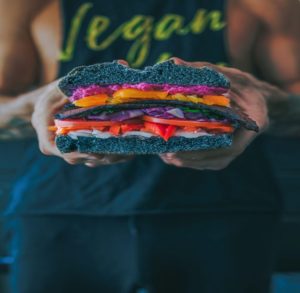12 Jan 2022 Veganuary 2022: What Are Your Responsibilities When Labelling Food Vegan?
The Vegan pound is in demand. Sales revenue of vegetarian and vegan food and drink products and plant-based alternatives in the UK grossed £1.1billion in 2019. The rising popularity of the vegan lifestyle means that 3% of the UK population now identify as vegan. But if you want a slice of the vegan pie, what does your business need to know about your responsibilities?
UK food business’s responsibility for vegan food labelling and food handling
Every January since 2014, hundreds of thousands of people sign up to Veganuary. Veganuary is a campaign that encourages people to try veganism for the month of January. The campaign was created by Jane Land in 2014 and has been endorsed by celebrities such as Ellie Goulding, Moby, and Leona Lewis.
The Veganuary website states that “it’s not about giving up anything or being perfect – it’s about exploring the wonderful world of plant-based foods”. It also says that “vegan food can be every bit as tasty and satisfying as any other kind of food”.
Vegan food may be just as tasty, but how can someone be certain that the food they buy is actually vegan? Given the topical nature of veganism at this time of year, we want to address the food industry’s responsibilities in properly labelling food as Vegan when trying to monetise veganism.
What are your business’s responsibilities to vegan consumers?
You may be surprised to learn that there are no legal requirements to label food as vegan, or suitable for vegetarians or vegans. The only legal stipulation is that any information provided voluntarily must not deliberately mislead consumers.
Your food business must also take care not to be ambiguous or confusing, or use wording that might result in a vegan or vegetarian person consuming food that is of animal origin unknowingly.
Consumer regulations in the UK require that all products sold commercially are accurately described and fit for their purpose. If you get it wrong, you could risk:
- Damaged reputation
- A claim under Consumer Rights Act or Sale of Goods Act
- Investigation by Trading Standards
- Investigation by FSA or DEFRA
- Investigation by Advertising Standards Agency regarding any marketing material used to promote the product in question
Any of the above actions could result in financial penalties or award damages to injured parties as a result of civil litigation.
If food labelling has been found to be either deliberately or mistakenly misleading, this can constitute a crime. This may lead to product recall action, or you may be ordered to redesign packaging or marketing materials to avoid misrepresentation or mislabelling.
How can food suitable for vegans and vegetarians be represented?
There are certifications and marks you can display on products, packaging and menus. The most recognisable and high profile is the logo of the Vegan Society.
It’s possible to apply to the vegan society for a licence to use their trademark. The Vegan Society will officiate this and inspect your product and your supply chain, ensuring that consumer trust and integrity is at the centre of all areas of your supply chain.
To use the Vegan Society trademark without permission would directly infringe trademark legislation.
Since there is no stringent legal guidance about how to portray Vegan or Vegetarian-friendly food, businesses must make their own decisions about if and when to apply labels that identify their products as safe for vegans or vegetarians.
Opportunities for sales exist, but the ethical and legal pitfalls are risks that are not always outweighed by the benefits. Where there is profit to be made, there is the potential for consumers to be taken advantage of, and the potential for food fraud throughout the supply chain is high.
Consumers who follow a vegan or vegetarian lifestyle have usually arrived at their decision by following strong personal values. There’s usually a high personal investment of time and emotions in ensuring they are living by the principles of veganism, The food industry has a crucial obligation that if they are going to try to monetise someone’s personal ethics, they should ensure due diligence about assuring their products do not infringe them, either deliberately or through error.
As with allergy sufferers, the UK food industry has a duty to respect and protect the rights of consumers to be fully informed and aware about the food they consume. There is also a lot of cross-over with vegan food and allergy sufferers. Many consumers with egg or dairy allergies actively seek out vegan alternatives to avoid their specific allergen in their diet. So there is a potential for damaging consumer health as well as causing psychological distress through misrepresenting or mislabeling food as vegan.
Due diligence is crucial
Just as with producing food suitable for allergy sufferers, there must be rigour and due diligence at every stage of the food handling process to prevent cross-contamination and ensure the integrity of your supply chain. Find out more about how our app, DUED, can help you maintain all due diligence records digitally. Email info@duedapp.com











